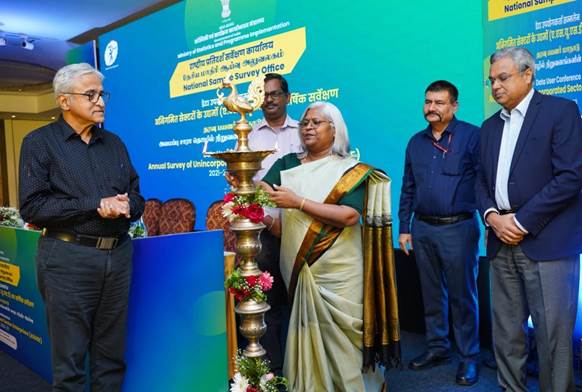The National Sample Survey Office (NSSO), Ministry of Statistics & Programme Implementation (MoSPI), is pleased to announce the successful conclusion of the Data User Conference on the Annual Survey of Unincorporated Sector Enterprises (ASUSE) for the periods 2021-22 and 2022-23 held today at the Le Royal Meridian Hotel in Chennai. This conference proved to be a pivotal platform for engaging with data users and stakeholders.
Approximately 150 officers from various Central Ministries/Departments, international organizations, and academic institutions attended the conference. Additionally, 50data users invited through open registration contributed to the vibrant discussions. Approximately 100 participants also joined through YouTube.

Prof. Rajeeva Laxman Karandikar, Chairman of the National Statistical Commission (NSC), Dr. Saurabh Garg, Secretary of MoSPI and Dr. N. Bhanumurthy, Director, Madras School of Economics graced the occasion. Esteemed members from the NSC, the Steering Committee of the National Sample Survey also attended. Members of various organisations were also present.
Ms. Geeta Singh Rathore, DG, National Sample Survey, MoSPI extended a warm welcome to all attendees and provided an insightful introduction to the ASUSE, highlighting its significance in capturing the economic and operational characteristics of unincorporated sector enterprises. Her address underscored the importance of collaborative efforts in leveraging data for informed decision-making and strategic planning.

Dr. Saurabh Garg expressed his pleasure at convening the conference and reiterated the Ministry’s commitment to bringing crucial data to the forefront. He acknowledged the successful conduct of the previous Data User Conference on the Household Consumption Expenditure Survey and emphasized the pivotal role of ASUSE data in understanding the unincorporated sector’s contribution to the economy. Further, he also mentioned that data is central to making informed decisions and strategic planning in today’s world. The vast information generated across various sectors has the power to reveal new insights, spark innovation, and tackle complex societal issues. However, the real value of data is found not just in gathering it, but in interpreting it accurately and applying it effectively. A solid understanding of data allows policymakers, researchers, and stakeholders to create focused interventions, manage resources efficiently, and ensure that development efforts are both inclusive and sustainable.

Dr. Bhanumurthy delivered a compelling special address, emphasizing the strategic importance of data in shaping effective economic policies. He highlighted how ASUSE data provides a critical understanding of the unincorporated sector, which is vital for crafting policies that support economic stability and inclusive growth.
Prof. Karandikar commended the efforts of MoSPI in strengthening data processes and reducing report release times. He stressed the importance of the ASUSE in offering detailed insights into the unincorporated sector and advocated for the use of this data in formulating policies that address the sector’s specific challenges and opportunities.
Following the inaugural session, technical sessions focused on various aspects of ASUSE were organised. The conference featured three insightful technical sessions:
- Detailed insights into the objective of ASUSE, Concepts and Definitions, Survey Methodologies, Sampling Design of ASUSE & key results.
- Understanding unit level data for tabulation using multiplier & Steps followed to ensure data quality. Using Unit Level Data for Enhanced Analysis.
- Data Collection process of ASUSE
The conference featured a dynamic panel discussion on “Enhancing Stakeholder Engagement through Data.” The discussion explored the value and applicability of ASUSE data, assessed its clarity and usability, and proposed improvements for better communication with stakeholders. It also addressed strategies for fostering collaborative engagement, including creating inclusive environments for data discussions and leveraging technology for enhanced interaction. This discussion highlighted the need to refine data processes and presentation to boost stakeholder’s engagement and improve decision-making.
Interactive sessions and panel discussions provided a platform for open discussions and Q & A session, allowing attendees to pose questions, share insights, and provide feedback on the ASUSE results. This engagement is expected to foster better utilization of the data and support informed decision-making across sectors.
The conference concluded with a spirit of collaboration and commitment to leveraging data for evidence-based policies and sustainable development, paving the way for a brighter future.

Comments are closed.